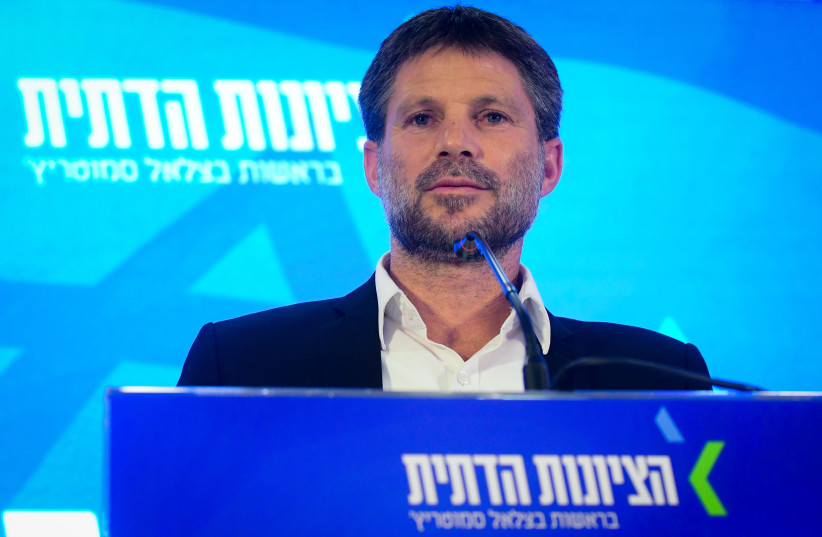In his opinion piece in this paper on October 24, Martin Oliner, copresident of the Religious Zionists of America, endorsed MK Bezalel Smotrich as the person that religious Zionists should be voting for. This endorsement comes only months after Oliner called for World Mizrachi to stay out of Israeli politics and “temporarily remain above the fray.” Six months on and the hiatus is over.
World Mizrachi and its affiliates like World Bnei Akiva have traditionally taken the view that they stay out of electoral politics in Israel. This has been the case ever since I was active in UK Bnei Akiva 30 years ago and the entire time I was cochair of World Bnei Akiva. The reason for this is simple.
In Israel, and perhaps even more so in the Diaspora, the religious Zionist community represents a broad spectrum of political opinions. All are connected by a set of core values, the Land of Israel, the Torah and the Jewish people. How these values are reflected in a specific political platform differ greatly.
This would be true no matter who was standing for election in the Knesset. However, this is not the only reason why in this specific election cycle, World Mizrachi and its leaders must remain above the fray.
Smotrich represents only a minority of religious Zionists
Over and above the basic right-wing political views which is a strong if not exclusive common denominator of the religious community in Israel, Smotrich’s coalition of parties displays altogether more extreme tendencies. Their extreme views on the Israeli Arab population, opinions about the LGBTQ+ community, even basic ideas on women’s rights are an anathema to many parts of the religious community in Israel and around the world. Historically they have represented a minority of the religious community.

Oliner discounts the controversy of Smotrich’s visit to the UK and the response of UK Bnei Akiva and Mizrachi as a misunderstanding. I think this gravely underestimates the groundswell of opinion viewing Smotrich and Ben-Gvir’s politics as being too extreme. This is not limited to UK Bnei Akiva and other parts of the Diaspora, but reflects disquiet here in Israel. It is true that many religious Israelis saw Bennett’s policies as divisive and many do not agree with MK Matan Kahana’s reforms on state and religion.
However, many others across the political and religious spectrum are right behind those same reforms, and consider Smotrich’s to be no less and perhaps even more divisive. I am among them.
In April of this year, Smotrich actually said that whoever is part of the current government should not be allowed into shul. This is just one example what Oliner considers to be “integrity, truth and consistency.” As much as Smotrich is part of the national religious community, so are MKs Matan Kahane, Chili Tropper and Moshe Tur-Paz.
Mr. Oliner correctly points out that historically the situation was simpler when the Mafdal (National Religious Party) represented the broadest cross-section of the religious community. This has not been the case for over 20 years with the steady disintegration of the Mafdal, starting with the Tekuma breakaway in 1999. Smotrich’s list, named “The Religious Zionist Party” is actually an amalgam of three different parties.
The anchor is Ichud Leumi and those with a good memory will know that it is Tekuma under a different name. Ichud Leumi was always politically more right-wing than the Mafdal, and in many ways Smotrich taking the helm is effectively a hostile takeover of the religious Zionist community, one now endorsed by Oliner.
The combination of Ichud Leumi, led by Smotrich, Otzma Yehudit, led by Ben-Gvir and Noam led by Avi Maoz has allowed those with more extreme views to vastly expand their political power, boosted by voters, some of whom are voting for them in spite of and not because of their more extreme positions. Until Smotrich rebranded his party the views represented by him and his partners on a number of issues were considered fringe to the point of beyond the pale. The idea that mainstream national religious rabbis would support a Meir Kahane follower would have been unthinkable only three years ago.
But the unusual state of Israeli politics has highlighted the attraction of its extremities, and the lack of a strong and moderate religious alternative is forcing many voters into a dilemma. Every religious person in Israel will resolve this dilemma personally, that is their democratic right, but it would be greatly damaging for important institutions like World Mizrachi or World Bnei Akiva to take a partisan approach.
The writer is founding partner of Goldrock Capital and founder of The Institute for Jewish and Zionist Research. He is a businessman and social activist. He currently cochairs the Coalition for Haredi Employment and is a former chair of Gesher and World Bnei Akiva.
